Moscow: Russia denied on Wednesday that Syrian President Bashar al-Assad was to blame for a poison gas attack and said it would continue to back him, setting the Kremlin on course for its biggest diplomatic collision yet with Donald Trump`s White House.
Western countries, including the United States, blamed Assad`s armed forces for the worst chemical attack in Syria for more than four years, which choked scores of people to death in the town of Khan Sheikhoun in a rebel-held area on Tuesday.
Washington said it believed the deaths were caused by sarin nerve gas dropped by Syrian aircraft. But Moscow offered an alternative explanation that would shield Assad: that the poison gas belonged to rebels and had leaked from an insurgent weapons depot hit by Syrian bombs.
Two U.S. officials, speaking on condition of anonymity, rejected Russia`s account: "That strains credulity," said one. "Russian assertions do not comport with reality."
The United States, Britain and France have proposed a draft UN Security Council resolution that would pin the blame on Damascus. But the Russian Foreign Ministry called the resolution "unacceptable" and said it was based on "fake information".
Kremlin spokesman Dmitry Peskov said Russia would take its case blaming the rebels for the poisoning to the United Nations.
"Russia and its armed forces will continue their operations to support the anti-terrorist operations of Syria`s armed forces to free the country," Peskov told reporters.
Video uploaded to social media showed civilians sprawled on the ground, some in convulsions, others lifeless. Rescue workers hose down the limp bodies of small children, trying to wash away chemicals. People wail and pound on the chests of victims.
The charity Medecins Sans Frontieres said one of its hospitals in Syria had treated patients "with symptoms - dilated pupils, muscle spasms, involuntary defection - consistent with exposure to neuro-toxic agents such as sarin".
The World Health Organization also said the symptoms were consistent with exposure to a nerve agent.
Turkish President Tayyip Erdogan said the attack had killed more than 100 people. That death toll could not be independently confirmed.
Hasan Haj Ali, commander of the Free Idlib Army rebel group, called the Russian statement blaming the rebels a "lie" and said rebels did not have the capability to produce nerve gas.
















